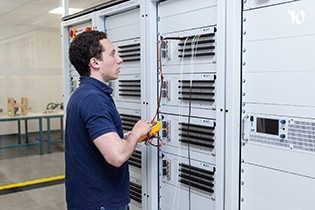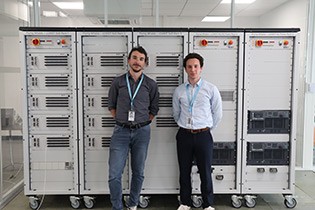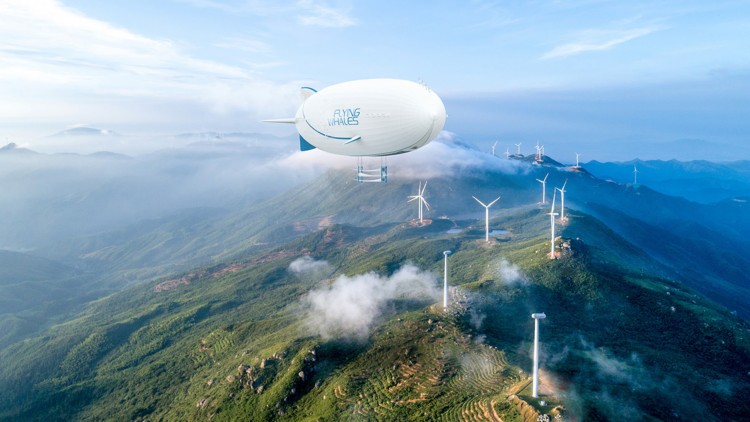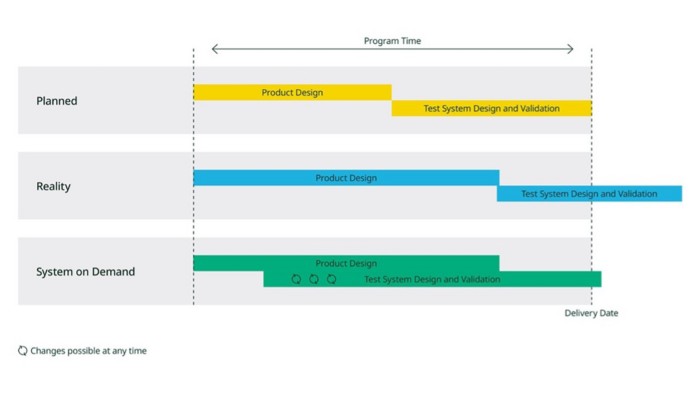Maximizing Airship Testing Efficiency with System on Demand
Olivier Specklin, CTO, FLYING WHALES
Case Study Highlights
- FLYING WHALES, in collaboration with NI, successfully developed and delivered the Iron Whale Bench in less than two quarters, significantly shortening their time to market.
- The modular and customizable SoD approach allowed FLYING WHALES to independently manage their testing process, adapt to changing requirements, and mitigate feature creep efficiently.
- NI’s support, including the use of their Düsseldorf Experience Center, enabled thorough pre-purchase risk mitigation and early integration capabilities, ensuring the functionality and reliability of all integrated systems.
“We chose NI’s SoD because, unlike other aeronautical projects that involve upgrading existing systems, ours started from scratch—with evolving design requirements and needs. We needed a partner who could offer a scalable, user-friendly test bench that we could fully control. NI’s SoD delivered the perfect, flexible test bench, empowering us to conduct our first initial tests on the Iron Whale with an ambitious timeline. NI’s tremendous support allowed us to independently manage the test bench and seamlessly prepare for ongoing and future initiatives.”
- Olivier Specklin, FLYING WHALES
The Challenge:
Airship testing faces technical and scheduling issues, such as validating functional chains and managing evolving certification standards. FLYING WHALES encountered these with their LCA60T airship, integrating mooring, flight control, and payload systems. They needed a flexible test bench to adapt to changing requirements and mitigate feature creep, reflecting broader industry challenges in risk reduction and resource availability.
The Solution:
Leveraging System on Demand (SoD), FLYING WHALES partnered with NI to develop the Iron Whale Bench, an airship integration test facility. The modular, customizable, COTS approach of SoD allowed FLYING WHALES to independently manage their testing process. Collaboration with NI’s Düsseldorf Experience Center enabled rapid development, completing Iron Whale in less than two quarters, significantly shortening their time to market.
The concept of airships gained momentum in the 18th century. With the introduction of power engines in the 1850s, the industry’s growth picked up speed. Nevertheless, during World War II, this advancement was abruptly stopped. Against this historical backdrop of ups and downs, the airship sector is currently undergoing an incredible comeback, driven by advances in technology and a rising need for creative modes of transportation. Market trends indicate a growing interest in airships across various sectors, ranging from cargo transport to emergency relief operations, as well as power generation, humanitarian aid, industry, logistics, flying care, transportation of woods and construction materials, handling cargos and oversized cargos, high-rise installations, firefighting, and special missions.
Guaranteeing the safety, reliability, and performance of airships warrants a rigorous and thorough testing phase. This stage of airship development presents distinctive challenges that demand specialized solutions to ensure the validation of crucial functional chains and the mitigation of associated risks. The components and systems of airships are critical, hence require specialized testing procedures. The scheduling constraints in airship testing and the complexity of airship systems mandate punctuality and rigorous validation to ensure safety, reliability, and performance. A comprehensive testing solution is essential, offering a holistic approach to tackling both technical and non-technical challenges such as timeline constraints, change management, and lifecycle management.
Challenges in Airship Testing
Airship testing faces numerous technical and scheduling challenges, largely stemming from the necessity to validate key functional chains before they can be integrated into real-world operations. Additionally, customers encounter significant hurdles related to risk reduction, accessibility to adequate testing facilities, ease of testing processes, and the availability of necessary resources.
One of the major challenges is feature creep. As a result of evolving specifications and ever-changing requirements, the airship test environments are subject to significant changes and rewiring during the whole development phase, which risks the program timeline and is expensive. A non-expandable test system further exacerbates this challenge, underscoring the necessity for a more flexible, modular system.
Another significant challenge is the certification process. While fixed-wing and rotary-wing aircraft have well-established procedures for obtaining certification, airship certifications are far less defined, requiring navigation through new and evolving guidelines set by national authorities, such as the European Union Aviation Safety Agency (EASA) and the Federal Aviation Administration (FAA).
Finally, the intense race to market in the airship sector presents another major challenge. With FLYING WHALES striving to be a frontrunner, numerous other companies are also in a competitive rush to develop their airships, including LTARE’s Pathfinder and HAV’s Airlander. These leading contenders face a multitude of uncertainties, including identifying the necessary tests to ensure safety and performance, managing ever-evolving design requirements, and dealing with the need to wait until the design phase is frozen before commencing testing. This competitive pressure adds complexity and urgency to the already demanding airship development and testing process.
The SoD Approach
System on Demand (SoD) is an agile system development process that takes advantage of modular and standard components to design, integrate, and deliver validation and functional test systems for LRU hardware, embedded software algorithms, hardware in the loop (HIL), integration labs, and more. The modular and commercial-off-the-shelf (COTS) approach works through leveraging preconfigured designs for most signal types. This guarantees that compatibility and functionality are evaluated in advance, avoiding the requirement for tailored designs. Each part, from signal connectivity and cabling to the rack infrastructure, is intended to be modular, allowing for easy assembly and adaptability.
SoD encompasses more than just standardized, assembled COTS hardware. Additionally, it includes a model-based design process, which allows us to fully model the system right from the proposal stage. As our single source of truth (SSOT), this model is used to generate all the artifacts required for building and configuring the system, including software configurations (drivers, switches, other components, and so forth). This capability allows us to swiftly react to design changes without needing manual revisions of the artifacts.
SoD also offers a flexible, adaptable, and modular solution that effectively tackles the challenges associated with airship testing. NI’s SoD solution consists of multiple essential elements:
- The NI-Düsseldorf Experience Center, which offers state-of-the-art testing facilities and expertise.
- A modular and COTS approach that facilitates quick deployment of customized testing solutions.
- A drastically shortened delivery time, reducing the average purchase order to delivery period from six months to just fifteen weeks.
- Committed local support from application engineers (AEs) and field application engineers (FAEs), ensuring thorough assistance during the testing process.
SoD’s model-based (MB) approach derisks projects by fully modeling the system during the proposal phase, providing the customer with a detailed specification rather than just a concept, as is typical in non-MB environments. Furthermore, the model-based design process and the highly standardized architecture allow for simple alterations, which dramatically accelerate the implementation of changes. Traditional methods often follow a waterfall process, which can lead to delays and increased costs due to rework when requirements change. SoD’s agile methodology allows for continuous integration and testing, reducing risk and speeding up delivery times. While other approaches may be rigid and less adaptive to changes, SoD’s flexibility and modular design make it superior for rapidly evolving project requirements.
FLYING WHALES Experience with SoD
FLYING WHALES, a pioneering startup in Suresnes, France, initially sought to transport French wood into isolated areas, but has since evolved to include applications such as emergency relief operations and wind blade transportation. Their vision extends beyond transportation; they aspire to operate as an airline company, emphasizing a low environmental footprint, low cost, flexibility, and safety. The LCA60T, their airship, offers point-to-point transportation, hovering capabilities for load and unload without environmental impact, low operating costs, and a rigid structure with multiple propulsion points for safety and controllability. It also boasts EASA certification and real-time fleet monitoring.

This expansion required thorough testing of electronic LRU controls, crucial components for their operations. The heart of FLYING WHALES’ testing process is the Iron Whale Bench, an electronics integration test facility where all flight and load exchange embedded computers, non-propulsive electrical system (NPES), and electrical wiring interconnect system (EWIS) are integrated. They utilize their own representative simulation model to introduce defects for robustness testing, and meticulously record instrumentation data. The Iron Whale Bench’s main objective is to integrate and validate the functional chains of the airship and mitigate technical and scheduling risks before real-world deployment.
The systems to be integrated and tested include mooring, non-propulsive electrical system (NPES), flight control system (FCS), avionics, all remote data concentrators (RDCs), navigation sensors, video surveillance system (VSS), payload system, ballast system, and lifting system.
Partnering with NI, FLYING WHALES harnessed the power of SoD to test and integrate their airship—a rigid, 60-ton airship—designed to be low cost, flexible, safe, and environmentally friendly with a minimal carbon footprint. The NI-FLYING WHALES project, which began in October 2023, saw remarkable progress with Iron Whale being developed and delivered in less than two quarters. This collaboration has been instrumental in ensuring all systems function flawlessly. The Iron Whale was developed in the NI Düsseldorf center, where its advanced facilities and expertise contributed to the project’s swift completion.

NI offers several key advantages. Customers can test much sooner due to early integration capabilities. The modularity of SOD’s test architecture allows for adding test capabilities to an existing system using the same script. The Experience Center at NI Düsseldorf helps by applying the testing methodology directly to the unit under test (UUT), allowing thorough pre-purchase risk mitigation.
Unlike other vendors that provide closed test systems, NI offers a customizable, software-defined COTS approach, enabling customers to own their test system. This open system provides customers with detailed information on how the test system was designed and built, ensuring transparency and flexibility.
This partnership has facilitated the validation of functional chains, the mitigation of technical and scheduling risks, and ensured the availability of testing resources. By leveraging NI’’s expertise and resources, FLYING WHALES has accelerated their development process, ensuring a shorter time to market. This strategic approach has already yielded substantial purchase orders, marking a significant milestone in their journey towards revolutionizing air transportation. SoD’s modular architecture enables FLYING WHALES to adapt to evolving specifications and requirements throughout the testing phase. SoD’s adaptability is demonstrated by its ability to seamlessly integrate new signal types and changes within the existing testing architecture, ensuring efficient and effective testing processes.
Key Takeaways
The partnership between NI and FLYING WHALES demonstrates how SoD has revolutionized airship testing. SoD expedited development timelines, reduced risks, and empowered manufacturers to overcome challenges. The premise of SoD is not only limited to airship testing, but also system integration, verification and validation testing, and certification testing. The principles of modularity and rapid adaptation can accelerate the development processes for other technologies, reducing costs and shortening time-to-market.
The aerospace industry can benefit from SoDs capability to handle compound integration tasks and validation processes, leading to more robust and reliable systems. This successful customer story illustrates broader applications of SoD in the aerospace industry, signaling a paradigm shift in testing methodologies and driving the development and adoption of airship technology. Beyond airship testing, the wider implications of SoD imply substantial potential for innovation and efficiency gains across a range of aircraft applications.


